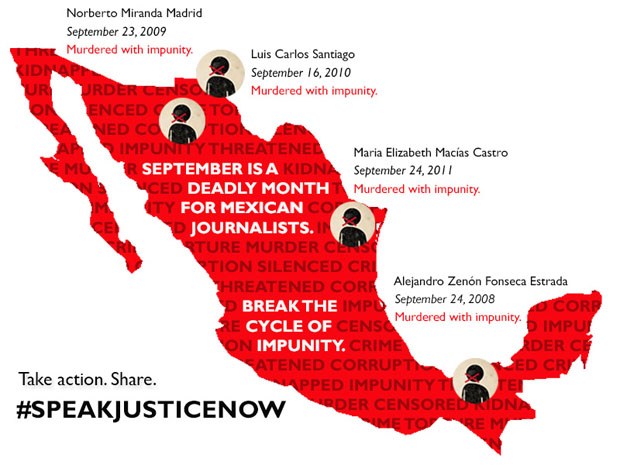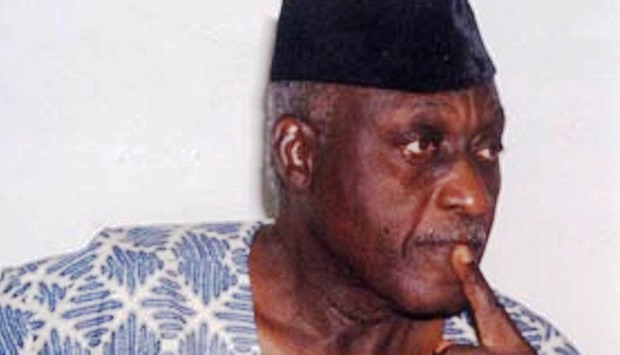24 Sep 2013 | Americas, Mexico, News
 This September marks the anniversary of the murders of four Mexican journalists. Alejandro Zenón Fonseca Estrada, Norberto Miranda Madrid, Luis Carlos Santiago and Maria Elizabeth Macías Castro were each killed within a year of each other, from 2008 to 2011. They were all covering drug cartels and corruption, and not a single person has been brought to justice in these murder cases.
This September marks the anniversary of the murders of four Mexican journalists. Alejandro Zenón Fonseca Estrada, Norberto Miranda Madrid, Luis Carlos Santiago and Maria Elizabeth Macías Castro were each killed within a year of each other, from 2008 to 2011. They were all covering drug cartels and corruption, and not a single person has been brought to justice in these murder cases.
Alejandro Zenón Fonseca Estrada, 33, host of a popular morning call-in show called “El Padrino Fonseca” (The Godfather Fonseca) was gunned down on September 24, 2008, by unidentified men as he was hanging up anti-violence posters.
Norberto Miranda Madrid, 44, was a Web columnist and host for the online station Radio Visión. He was shot multiple times by two masked gunmen in the offices of the radio station on September 23, 2009.
Luis Carlos Santiago worked as a photographer with the local daily El Diario. On September 16, 2010, he was shot and killed by unidentified gunmen. He was 21.
Maria Elizabeth Macías Castro, 39, tweeted about activities of criminal groups and covered the topic on the website Nuevo Laredo en vivo (Nuevo Laredo Live) using the pen name “La NenaDLaredo” (The girl from Laredo). On September 24, 2011, her decapitated body was found with a note that identified the website and her pseudonym.
Speak Justice Now is a campaign against impunity by the Committee to Protect Journalists. We encourage you to join thousands around the world to tweet Mexican President Enrique Peña Nieto today demanding an end to impunity using the hashtag #SpeakJusticeNow.
24 Sep 2013 | Europe and Central Asia, Italy
The European Court of Human Rights have today ruled in favour of an Italian journalist sued for defamation, citing Article 10 of the European Convention on Human Rights which protects the right to freedom of expression.
Maurizio Belpietro was convicted in Italy on defamation charges for a story published in national newspaper Quotidiano Nazionale in 2004, when he was paper’s director. The story, penned by an Italian senator, accused Italian judges and prosecutors ‘of using political strategies in their fight against the Mafia.’
Two prosecutors sued both Belpietro and the senator in question, arguing the article was defamatory. The latter was acquitted on the basis that he had written the article in his role as a senator. Belpietro, while also initially acquitted, was in 2009 given a suspended 4-month jail sentence, as well as being ordered to pay substantial sums to the plaintiffs. His appeal was dismissed in 2010.
Belpietro took the case to the European Court of Human Rights, which today ruled that the conviction was in violation of Article 10. He was awarded €10,000 in non-pecuniary damage and €5,000 for costs and expenses.
23 Sep 2013 | News

Brad Camembert / Shutterstock.com
It never occurred to me, when I started to write that what I was writing was controversial. Much of it grew out of my own feelings and concerns when I was young.
There were few challenges to my books then, although I remember the night a woman phoned, asking if I had written Are You There God? It’s Me, Margaret. When I replied that I had, she called me a communist and slammed down the phone. I never did figure out if she equated communism with menstruation or religion, the two major concerns in 12-year-old Margaret’s life.
But, in 1980, the censors crawled out of the woodwork, seemingly overnight, organised and determined. Not only would they decide what their children could read, but what all children could read. Challenges to books quadrupled within months, and we shall never know how many teachers, school librarians and principals quietly removed books to avoid trouble.
Censorship grows out of fear and, because fear is contagious, some parents are easily swayed. Book banning satisfies their need to feel in control of their children’s lives. This fear is often disguised as moral outrage. They want to believe that if their children do not read about it, their children will not know about it. And if they do not know about it, it will not happen.
Today, it is not only language and sexuality (the usual reasons given for banning my books) that will land a book on the censors’ hit list. It is Satanism, New Age-ism and a hundred other ‘isms’, some of which would be laughable if the implications were not so serious. Books that make kids laugh often come under suspicion; so do books that encourage kids to think, or question authority; books that don’t hit the reader over the head with moral lessons are considered dangerous.
My book Blubber was banned in Montgomery County, Maryland, for ‘lack of moral tone’ and, more recently, challenged in Canton, Ohio, for allowing evil behaviour to go unpunished. But in New Zealand it is used in teacher-training classes to help explain classroom dynamics. Censors do not want children exposed to ideas different from their own. If every individual with an agenda had his or her way, the shelves in the school library would be close to empty.
But I am encouraged by a new awareness. This year I have received a number of letters from young people who are studying censorship in their classes. And in many communities across the country, students from elementary through to high school are becoming active (along with caring adults) in the fight to maintain their right to read and their right to choose books. They are speaking before school boards, and, more often than not, when they do, the books in question are returned to the shelves.
Only when readers of all ages become active, only when readers are willing to stand up to the censors, will the censors get the message that they cannot frighten us.
Judy Blume writes books for readers of all ages. This article was first published in Index on Censorship magazine in 1993
To subscribe to Index on Censorship magazine, including free access to our archive, click here
23 Sep 2013 | News

From “Africa’s Subversive Litanies” – Robert Fraser, Index on Censorship Magazine, October 1980
In contemporary West Africa the writer’s shell may occasionally be of his own making, the artifact of inhibition or doubt. Often, however, it is made of harder stuff, as Kofi Awoonor, one of Ghana’s senior poets, discovered to his cost. He was detained in 1977 for suspected collusion in an abortive attempt to remove a government which was itself the product of a military uprising.
The extent of Awoonor’s guilt was giving temporary shelter to a fellow Ewe out of favour with the authorities. Yet at his trial thirteen defence barristers failed to secure his release; their evidence was declared inadmissible before the proceedings had even started. Awoonor’s subsequent detention in Usher Fort did little to mitigate the acute political scepticism which had
earlier driven him to seek asylum in America. He captured the feeling with characteristically sardonic sadness in his poem ‘When My New Passport Came and I was given a Year’:
Oh, I know you curse my name
and say that I have fled; you call for
silence from my parched winter lips;
I received the other day your passport
with the one year stamp
and the order that I cannot renew
myself in alien lands.
But I renew myself here
in winter’s beginning day
awaiting the coming of the sun
so that your son will be ready
for the snake-shrouds of homecoming.
 This September marks the anniversary of the murders of four Mexican journalists. Alejandro Zenón Fonseca Estrada, Norberto Miranda Madrid, Luis Carlos Santiago and Maria Elizabeth Macías Castro were each killed within a year of each other, from 2008 to 2011. They were all covering drug cartels and corruption, and not a single person has been brought to justice in these murder cases.
This September marks the anniversary of the murders of four Mexican journalists. Alejandro Zenón Fonseca Estrada, Norberto Miranda Madrid, Luis Carlos Santiago and Maria Elizabeth Macías Castro were each killed within a year of each other, from 2008 to 2011. They were all covering drug cartels and corruption, and not a single person has been brought to justice in these murder cases.

